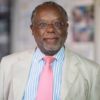With razor-thin margins in crucial swing states, the race for president was too close to call on Tuesday. But one thing was clear early on, said Ted Landsmark, distinguished professor of public policy and urban affairs at Northeastern—the U.S. is as politically polarized as ever, and it’ll take more than a national election to bring people back together.
“At this point, the election reaffirms how divided the American electorate is,” Landsmark said late Tuesday night. “It emphasizes that there’s a great deal of healing that will have to take place, and whatever the outcome, that healing appears unlikely to be initiated in Washington.”
The COVID-19 pandemic changed the contours of the hard-fought race between President Donald Trump and former Vice President Joe Biden—from the way people voted to the issues that were important to them. A wave of early, mail-in, and absentee voting skewed the return count on election night, which made it impossible to determine a clear winner by Wednesday.
“We’re not going to know much of a final result for another couple days,” said Landsmark, who is also the director of the Kitty and Michael Dukakis Center for Urban and Regional Policy at Northeastern. “As the numbers come in, it’s increasingly clear that there will be litigation in some jurisdictions, and it certainly appears at this moment to be unlikely that either party will concede at the national level.”
Landsmark said he’ll be keeping an eye on the courts this week, as well as city and regional planning and policies, and the leadership of local non-profit organizations.




